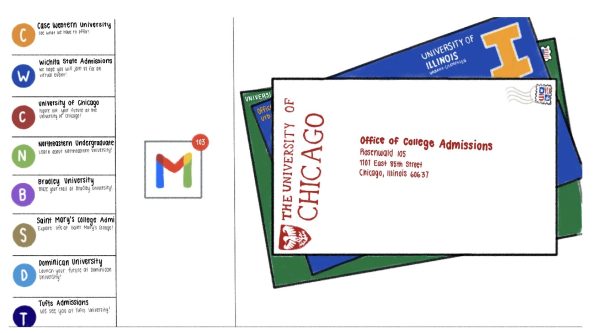Mental Health at the Midsemester: Fenwick Adapts to a New Normal
The word “challenging” would be an understatement to describe 2020. After a full year of at-home learning, students and teachers are finally back in school full time. We jumped from very little time to seven hours a day, five days a week, in the classroom. Faculty and students are still figuring out how to navigate this abrupt change in pace. Now, at the end of the first quarter, so many questions remain. Should students be held accountable for forgetting study habits and not sticking to routines? How can we get used to being in a social setting once again? And most importantly: how can we handle the stress of it all?
The stress of the new school year has been weighing on the shoulders of the student body and faculty heavily. Being tossed into a new school year after so much time without structure has been a massive adjustment for many in the Fenwick community. Izabella Ibarra, a junior, stated, “I would describe this transition as challenging to say the least, getting used to being around so many people again can be overwhelming.” Not only has it been hard for people to reacclimate themselves to a social environment, but it has been especially difficult to adjust academically. “The most difficult part of e-learning was trying to keep myself from procrastinating and staying focused on my schoolwork. However, I feel like I’ve learned a little from last year. I have set a routine and it has been making things less stressful for myself,” Ibarra said. Creating a routine is easier said than done, and it can be overwhelming to create a schedule and apply it to the day.
Although it might be difficult to make a routine and stick to it, having one can be extremely helpful in the long run. NorthShore University released an article in September 2019 that walks readers through Dr. Amanda Caplan’s tips and tricks for creating a new schedule and sticking to it. Dr. Caplan’s first step is to decide what you want to be in your routine. Think about what you want to achieve. You can set aside time for yourself to study and do homework, but it’s also important to schedule time for yourself to relax. The next step is to set small goals for yourself. Dr. Caplan writes, “if your overall goal is to eat healthier meals, start by changing one thing a day, every day, to build confidence. When you accomplish that, congratulate yourself!” If your goal is to study more, try studying in increments. Take 25 minutes to read or study, then take the next 5-10 minutes to give your brain a rest, and repeat this in a cycle until you have accomplished your task. Dr. Caplan’s next tip is to lay out a plan. You should start small, one week at a time, and one goal at a time. It might help to write out your plan in a journal or calendar. Do not try to make a list of all the changes you want to make. Instead, pick one thing you want to work on, and dedicate your time to incorporating it into your daily life. For example, if you want to study more, eat healthy, work out, and learn a new hobby, you should choose one of these things at a time to slowly work into your routine. You can begin with something as little as having a banana for breakfast every morning. Once you have successfully completed this goal, try the next task! If you try to do them all at once, it will be harder to stick to it. Lastly, Dr. Caplan urges us to be prepared and make sure we are completely satisfied and ready to start our new routine. Make sure you have the resources necessary to aid you in being successful with following your new plan. Dr. Amanda Caplan goes on to say that we should make having a routine fun. Track your progress and reward yourself for completing new goals. And remember, sticking to a routine does not just happen overnight! Be patient with yourself, and acknowledge the importance of completing goals, no matter how big or small. One last bit of advice that was not featured in the NorthShore article is to use resources that hold you accountable. Some helpful tactics in doing this are creating lists of things you need to do, and rewarding yourself each time you cross something off.
Though this year has been hard on us all, many students have been taught the value of having a routine. After not being in school, and having no schedule, many struggled to hold themselves accountable, but there are new strategies that all Friars, both students and faculty, can employ to ease this jarring transition. Most importantly, don’t be afraid to reach out if you are struggling. We have so many great resources right at our fingertips, whether you are paying a visit to Friar Mentors, the Write Place, or our admirable social workers, Ms. Winkler and Ms. Drennan, know that everyone in this community is ready to support you with open arms. We are all here to help push and support each other to do the best that we can. As Robert Frost wrote in his poem, “A Servant to Servants,” “The best way out is always through.”








